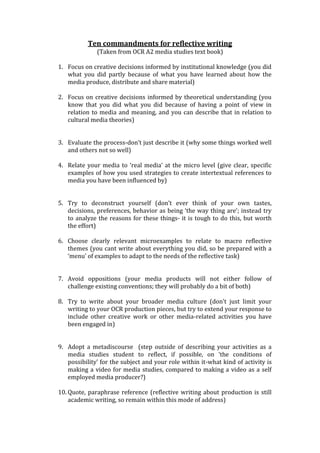Ten commandments for reflective writing
•Descargar como DOCX, PDF•
1 recomendación•453 vistas
Denunciar
Compartir
Denunciar
Compartir

Recomendados
Recomendados
Más contenido relacionado
Similar a Ten commandments for reflective writing
Similar a Ten commandments for reflective writing (20)
Basic types of sources· case studiesexamplesprior events.docx

Basic types of sources· case studiesexamplesprior events.docx
Composition II Advocacy Assignment · Peer Review Essay III bet

Composition II Advocacy Assignment · Peer Review Essay III bet
Research Proposal Assignment Research Proposals exist for tw.docx

Research Proposal Assignment Research Proposals exist for tw.docx
Más de Ms Olive
Más de Ms Olive (20)
Ten commandments for reflective writing
- 1. Ten commandments for reflective writing (Taken from OCR A2 media studies text book) 1. Focus on creative decisions informed by institutional knowledge (you did what you did partly because of what you have learned about how the media produce, distribute and share material) 2. Focus on creative decisions informed by theoretical understanding (you know that you did what you did because of having a point of view in relation to media and meaning, and you can describe that in relation to cultural media theories) 3. Evaluate the process-don’t just describe it (why some things worked well and others not so well) 4. Relate your media to ‘real media’ at the micro level (give clear, specific examples of how you used strategies to create intertextual references to media you have been influenced by) 5. Try to deconstruct yourself (don’t ever think of your own tastes, decisions, preferences, behavior as being ‘the way thing are’; instead try to analyze the reasons for these things- it is tough to do this, but worth the effort) 6. Choose clearly relevant microexamples to relate to macro reflective themes (you cant write about everything you did, so be prepared with a ‘menu’ of examples to adapt to the needs of the reflective task) 7. Avoid oppositions (your media products will not either follow of challenge existing conventions; they will probably do a bit of both) 8. Try to write about your broader media culture (don’t just limit your writing to your OCR production pieces, but try to extend your response to include other creative work or other media-related activities you have been engaged in) 9. Adopt a metadiscourse (step outside of describing your activities as a media studies student to reflect, if possible, on ‘the conditions of possibility’ for the subject and your role within it-what kind of activity is making a video for media studies, compared to making a video as a self employed media producer?) 10. Quote, paraphrase reference (reflective writing about production is still academic writing, so remain within this mode of address)